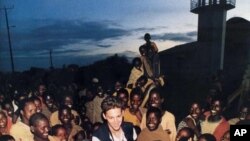Artist, activist and photojournalist Dan Eldon lived a short, yet full, life expressing himself through photos, drawings and journals. He died almost two decades ago, at age 22, covering a story he believed was important for the world to know about.
As a teenager, Eldon combined his passion for art, activism and adventure into a personal philosophy he called, "Safari as a Way of Life."
Eldon's special brand of creative activism has inspired a school curriculum, books, a TV documentary and a nonprofit devoted to motivating others who share his vision.
Providing inspiration
He grew up with a unique outlook on life, according to his mother, recalling his childhood in Africa.
“I was a journalist in Kenya, but my husband was running a computer company. We moved there when Dan was seven and his little sister was three. Dan was able to experience people and a way of life that most children are not privileged to experience," Kathy Eldon says. "He watched very creative, active people in action and Dan took on those qualities of activism and compassion.”
Writer Jennifer New never met Dan, but she came to know him through his journals and the dozens of interviews she’s done with his family and friends. New developed a high school curriculum based on Dan’s interests in art, journalism and African studies, and authored two books featuring his photos, paintings, collages and journals.
“He was an extremely curious person, more curious than a lot of people his age. He was this amazing artist,” she says. “He had this charming ability to raise money from a very young age.”
Activism and compassion
At age 14, New says, Dan and his sister raised money to pay for a young Kenyan girl's heart surgery. As a 19-year-old college student in California, he raised $20,000 to help refugees in Malawi.
“They decided they wanted to personally deliver the money to the refugee camp and there ended up being 14 of them, all teenagers except for one person who had just turned 20," New says. "They’re from six different countries of origin. A lot of them hadn’t even met each other. They all land in Kenya and meet at Dan’s father’s house. They’ve got two Land Rovers and they’ve got all this cash and they take off on this crazy, crazy road trip.”
In 1992, the Reuters news agency hired Eldon as a photojournalist to investigate rumors of a famine in Somalia. His photos appeared in Time and Newsweek as well as other magazines and newspapers around the world. When violence broke out in Somalia the next year, Kathy Eldon called her son and asked him to come home.
“Dan said, ‘Mom, don’t ask me to leave please, the story isn’t over,’" she remembers. "I said, ‘I love you so much and I’m proud of you.’ He and I agreed to see each other in two weeks.”
She never saw him alive again.
“A week later, my son, together with three other journalists, was beaten and stoned to death while trying to cover a story," Kathy Eldon says. "I know that a part of me died with Dan, as happens with parents who lose children.”
Positive action
To transform her grief into positive action, Kathy Eldon and her daughter, Amy, founded a non-profit.
“We created Creative Visions Foundation dedicated to supporting what we call creative activists, people who use media and the arts for good.”
Since 2001, Creative Visions Foundation has worked with 90 grassroots activists to create films, books, exhibits and social movements. One of those activists is 24-year-old Jessica Mayberry.
“Jessica wanted to go to India and teach basically illiterate Indian women how to use video to tell stories that were important about their lives. And over the years her organization, Video Volunteers, has become the largest producers of community-based videos in India.”
Filmmaker Roko Belic has been supported by Creative Visions Foundation for almost 10 years. His most recent project is a documentary called "Happy."
“I interviewed a lot of scientists who have been studying happiness," says Belic. "And I went around the world to 14 countries to shoot stories of people whose lives illustrate some of these findings of the scientists."
Belic actually knew Eldon. He was one of the teenagers who accompanied him on that 1989 trip to the Malawi refugee camp.
“I feel that we are all creative. It can be extremely rewarding to do things that you feel having a positive impact as I feel with the projects I’ve worked on so far.”
Belic says he tries to do through his projects, what that trip to Malawi with Eldon did for him - inspire young people to use their creativity to improve the world around them.





